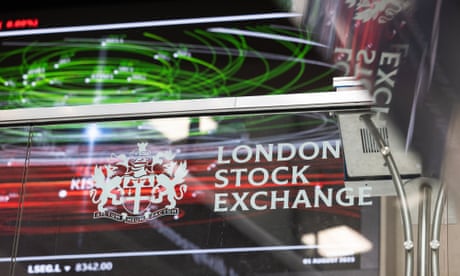
The UK stock market has hit an intraday record high, lifted by hopes of interest rate cuts and easing geopolitical tensions, after setting a new closing high on Monday. The FTSE 100 index touched 8,076 points at the opening bell on Tuesday, surpassing a previous high of 8,047 reached in February 2023. We explain what is behind the rising London market.
Why is the FTSE 100 rising now?
UK shares have been buoyed up by expectations of two UK interest rate cuts this year, and a lack of escalation in the Middle East in the last few days. The UK economic picture has improved, with inflation slowing, the economy returning to growth after a shallow recession at the end of 2023 and hopes that real wages can rise without triggering a wage-price spiral.
The FTSE 100, which was created 40 years ago, has been rising steadily in recent weeks amid hopes that the Bank of England will cut interest rates soon from their level of 5.25%, as inflation (now at 3.2%) moves towards the central bank’s 2% target.
It would be the first interest rate reduction since March 2020. Having been the first big central bank to raise rates in the current cycle, the Bank is now expected to be one of the first of its peers to start cutting rates, before the US Federal Reserve, which is still battling stubbornly high inflation. Traders are now building up bets that the Fed could raise rates again, with markets pricing in a one-in-five chance of a US rate rise within the next 12 months.
This has led to divergent fortunes for both countries’ currencies, causing the pound to weaken. Lower interest rates mean lower returns for investors.
How does it compare internationally?
The UK has been in the shadows of the US stock market for the past decade, partly because of the FTSE’s low exposure to the tech sector. That has proved a surprise boon in recent months, however, after nearly $1tn was wiped off the “Magnificent 7” tech stocks’ combined market value last week. The microchip designer Nvidia and the electronic carmaker Tesla both tumbled, netting traders who bet against them – known as short-sellers – billions of dollars.
The FTSE 100 did not have a great year in 2023, when it rose 3.8%, held back by a stagnating economy and volatile political climate. Despite its recent rise, the index is still lagging behind its European peers. It is up 4% so far this year, behind the 7% increases in the German and French stock markets, and Italy’s 12% gain.
Isn’t the FTSE 100 meant to be ‘Jurassic Park’?
The UK stock market has lost some of its allure with a decline in listings and a string of firms opting to list on Wall Street instead, such as the British chip designer Arm last September.
Shell’s chief executive, Wael Sawan, has hinted that the oil company could abandon its London primary listing, saying that if the firm’s valuation gap with its US peers does not close, “we have to look at all options. All options”.
The FTSE has faced heavy criticism in recent years, thanks to its collection of older, low-growth companies. Paul Marshall, the boss of the £40m ($55bn) hedge fund Marshall Wace, wrote in 2021 in the Financial Times that the City of London risked becoming “a sort of Jurassic Park”.
Brexit and political uncertainty have also weighed on the FTSE. “That’s led to cheap valuations and a mountain of unloved stocks,” said Russ Mould, the investment director at AJ Bell.
“Investors are finally getting the message that a good chunk of these businesses still have a lot to offer, delivering slow but steady profit growth, and they’re available for a fraction of the price of some of their overseas peers.”
What’s happening to sterling and the dollar?
A weaker pound has contributed to the rise in the FTSE 100, as stocks move in an inverse relationship to the currency.
About three-quarters of the FTSE 100 are large international companies that earn their revenues in dollars and report their profits in sterling. This means that when the dollar strengthens, these companies become more profitable in sterling terms. Higher US interest rates make dollars more attractive to hold, and so demand for dollars has increased, driving up the greenback’s value.
What does it mean for me?
Those invested in UK shares will be cheering the rise in the FTSE after a long period of underperformance. Many big FTSE companies also pay decent dividends. Rolls-Royce is the best performer so far this year, after its success last year, with traders encouraged by the turnaround plan being implemented by the new chief executive, Tufan Erginbilgiç.
On Tuesday, almost everything was trading higher apart from mining stocks, after Primark owner Associated British Foods’ upbeat trading and JD Sports’ expansion in the US.